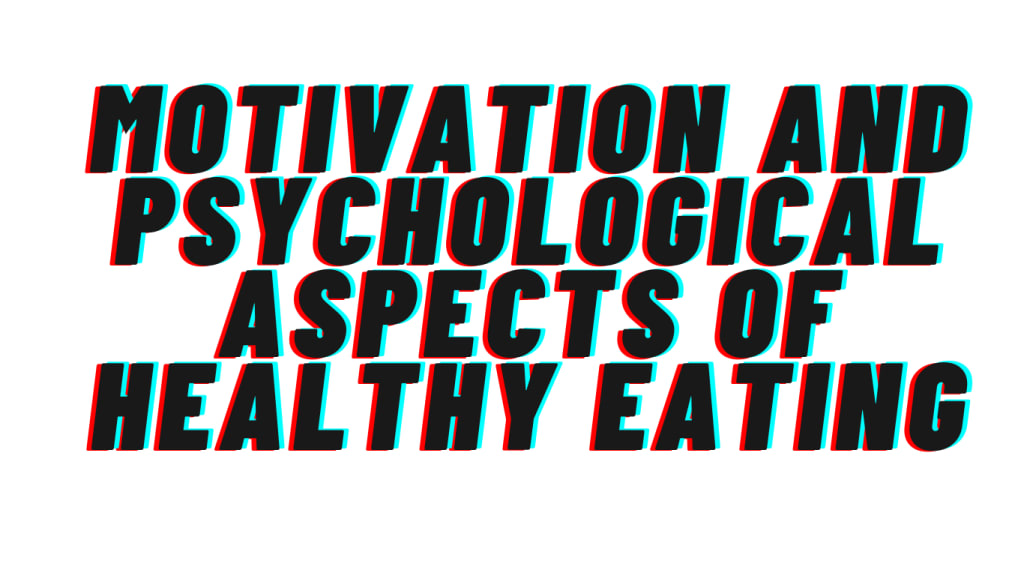Motivation and Psychological Aspects of Healthy Eating
The problem of overweight and obesity has its own medical, social, economic, and psychological aspects. This paper analyzes the way goals, mindsets, and personal beliefs affect motivation to engage or disengage in healthy eating behavior. It is due to the serious consequences and the growing epidemiological frequency of morbidity in people with nutritional disorders.

Introduction
One of the main issues in psychology is the issue of motivation and the motivations behind behavior and activity intended to produce a beneficial outcome. Additionally, these concerns are significant in procedures that have a direct impact on the person's health. Overweight and obesity are issues with their own medical, social, economic, and psychological components. This is because nutritional problems have major side effects and are becoming more common epidemiologically (Monaghan et al., 2018). The reason to engage in or refrain from engaging in healthy eating behavior is examined in this essay in relation to objectives, mindsets, and personal beliefs.
Goals
When someone is faced with an achievement circumstance that puts into question their sense of competence, goal setting refers to their motivational domain. Psychological research has traditionally divided goal attainment or motivation into two categories: the motivation for success and the motivation for avoiding failure. In a new paradigm put forth by Hangen et al. (2019), the following motivational kinds are identified. Prioritize first gaining mastery (the desire to feel competent through personal effort). Second, the emphasis on eschewing the display of mastery (the desire to avoid feelings of incompetence). Third, concentrate on demonstrating the outcome (the desire to be competent in the eyes of others). Fourth, concentrate on avoiding the result's demonstration (the desire to avoid incompetence in the eyes of others). According to a review of the literature, the major theories of motivation were drawn from a variety of sources, including self-concept theories, theories of internal and external motivation, self-determination theory, and expected value theory (Deckers, 2018).
Three theories—intrinsic/extrinsic motivation, self-determination theory, and expected value theory—are commonly debated in the literature with regard to the distinction between skill and efficiency (Deckers, 2018). A strong interest in the work being done is a reliable indicator of intrinsic drive for success. A person's self-determination, or desire for autonomy and choice, is another reliable indicator of skill motivation.
Mindsets
There are four different attitudes that are important to the conversation. First, it is a growth mindset, which is the conviction that, with work, a person's intellectual talents can develop throughout the course of their lives (Dweck, 2016). A growth mentality is predicated on the idea that a person may constantly progress, in contrast to a fixed mindset, which holds that human intelligence is a fixed feature. People with a growth mindset are not afraid of challenges and failures; rather, they view these things favorably. The most crucial experience is a negative one because without it, progress toward a goal is frequently impossible. A growth mentality is characterized by a positive outlook on change and the capacity to quickly step beyond of one's comfort zone. Second, a solution-oriented attitude is founded on the extrapolation of practical experience and is connected to concrete problems. This way of thinking concentrates on finding solutions to new issues, which influences how much procrastination there is (Brenner et al., 2016). Third, the curiosity mindset emphasizes asking questions about life's phenomena and discovering solutions to them, as the name suggests. This type of mindset must have the ability to generate a lot of unique ideas under uncontrolled circumstances, as well as developed linguistic creativity and insight, a high level of introspection, inquisitiveness, fantasy, and emotional self-control (Brenner et al., 2016). The abundance mindset, which holds that everyone has more than enough of everything in the world and that having something does not necessarily mean that someone else is lacking, and that life is not a race in which people are constantly comparing themselves to one another, is the last one (Yost et al., 2019). Additionally, the advantages do not disappear when people share their joy, success, and knowledge with others; on the contrary, there are additional advantages. The solution-oriented mentality is the most suitable for a drive to engage in healthy eating behavior to arise and stabilize, even though all four of these types emphasize positive thinking and offer strengths and benefits to empower a person.
Individual Beliefs
When someone thinks that they have no control over external events and are powerless to stop or change them, they experience a sense of helplessness (Trindade et al., 2020). "Learned helplessness" is evident if this state and the motivational and attributional characteristics connected to it are applied to other circumstances. A little history of how the world is uncontrollably unpredictable is sufficient for the learned helplessness to start to exist almost independently and regulate the person's conduct. Learned helplessness is regarded as a mental illness that significantly contributes to the development of addictive eating habits (Bullivant et al., 2020).
The notion of self-efficacy emphasizes how action is dependent on a person's judgment of their own competence and confidence in their ability to utilize their talents to successfully complete the task. In Bandura's theory, particular attention is given to the dynamics of the development of self-efficacy: personal results, their assessment by others, and observation of other people's behavior can lead to a strengthening or weakening of self-efficacy, which in turn affects the decision of future behavior and the evaluation of future results (Williams & Rode, 2016). This explains why it is challenging to verify the causal relationship between self-efficacy and healthy eating. Because of this, it is common to discuss the interaction of two factors: low self-efficacy increases the desire to delay or avoid eating healthily, weakens persistence in achieving goals and overcoming challenges, and negative experiences related to unhealthy eating, such as guilt and self-blame, keep self-efficacy at a low level.
Mastery beliefs are "people's ideas about their power to influence and modify life situations," according to Drewelis et al. (2018). (p. 789). The development of learned helplessness and the individual's conception of self-efficacy are intricately tied with mastery beliefs. Without the reality of their self-efficacy and mastery beliefs, healthy behaviors and a person's motivation to engage in them are impossibly linked to these three ideas.
About the Creator
indika sampath
hello world
my name is indika sampath so I'm a article writer. you also can learn by reading somethings that important things.
thank you so much for visiting my profile






Comments
There are no comments for this story
Be the first to respond and start the conversation.